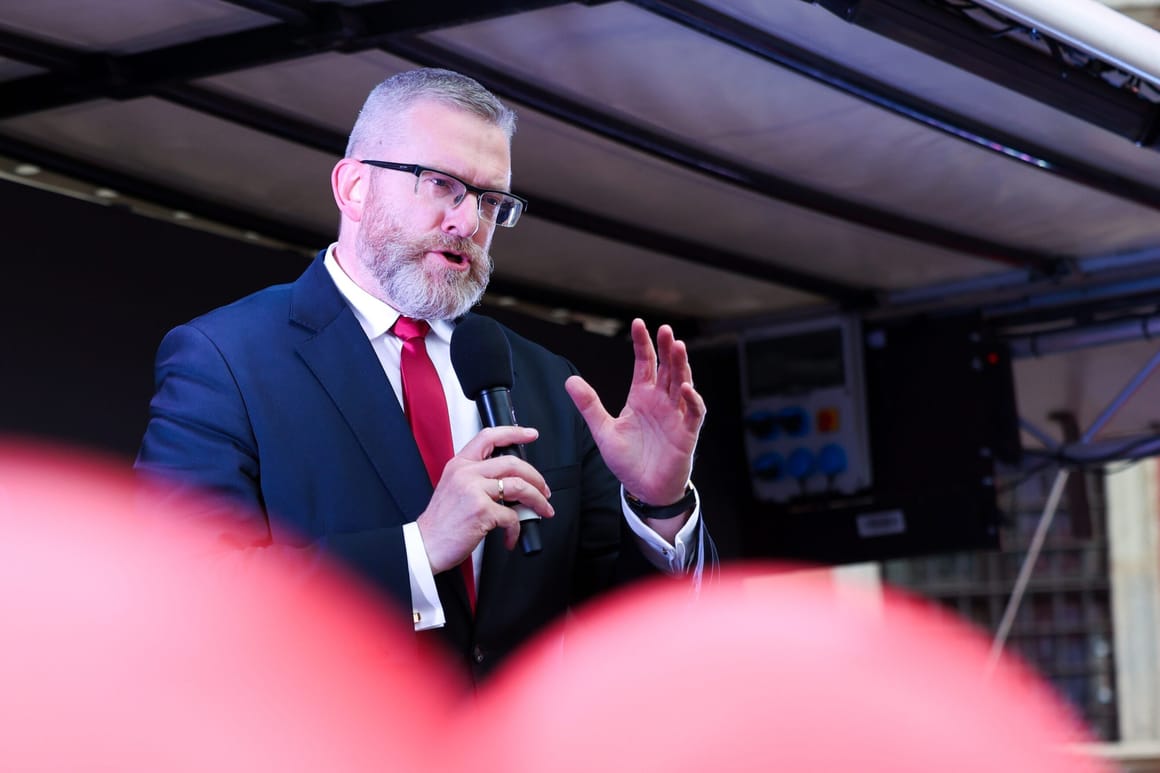Politics
Polish Prosecutors Investigate Far-Right MEP for Auschwitz Denial

Polish prosecutors have initiated a criminal investigation into far-right Member of the European Parliament, Grzegorz Braun, for publicly denying the atrocities committed at the Auschwitz-Birkenau death camp during World War II. This inquiry was launched on July 10, 2023, following Braun’s comments made during a live interview on Radio Wnet.
The investigation falls under the jurisdiction of the Commission for the Prosecution of Crimes Against the Polish Nation in Kraków. Prosecutors assert that Braun’s statements denied “in public and contrary to established facts” the genocide perpetrated by the Nazis at Auschwitz from 1941 to 1944, particularly the use of gas chambers to murder Jews and other victims. Historical records indicate that approximately 1.1 million people were killed at the camp.
The legal framework for this investigation is established under Article 55 of Poland’s Act on the Institute of National Remembrance, which criminalizes Holocaust denial, punishable by up to three years in prison. The decision to pursue legal action was influenced by formal complaints from various public institutions and prominent figures, including the Director of the Auschwitz Museum, Piotr Cywiński.
During the controversial broadcast, Braun referred to the gas chambers at Auschwitz as “a fake” and accused the state-run museum of suppressing legitimate research while promoting a “pseudo-historical narrative.” The host of the show, Łukasz Jankowski, concluded the interview early, indicating that Braun’s remarks had crossed a line.
In a statement on social media, Cywiński emphasized the gravity of denying the existence of gas chambers, describing it as not only an expression of antisemitism and hatred but also a criminal act under Polish law. He also announced that the museum intends to pursue a defamation lawsuit against Braun.
Braun’s remarks were made during an event in Jedwabne, a village in northeastern Poland, commemorating the anniversary of a 1941 pogrom. Historical accounts suggest that local Poles, under German supervision, murdered over 340 Jews, with many victims burned alive in a barn. Braun and other Polish nationalists have rejected these historical findings, a stance that has drawn significant criticism.
This incident adds to a pattern of inflammatory actions by Braun, who has previously disrupted a Holocaust memorial ceremony in the Polish parliament, vandalized an LGBTQ+ exhibition, and confronted a doctor performing abortions. Braun was a presidential candidate in the recent May elections, where he garnered 6.34 percent of the vote.
The ongoing investigation underscores the tensions surrounding historical narratives in Poland, particularly regarding the Holocaust and the role of Polish citizens during that time. As the case progresses, it may have broader implications for the discourse surrounding historical memory and accountability in Europe.
-

 Health3 months ago
Health3 months agoNeurologist Warns Excessive Use of Supplements Can Harm Brain
-

 Health4 months ago
Health4 months agoFiona Phillips’ Husband Shares Heartfelt Update on Her Alzheimer’s Journey
-

 Science2 months ago
Science2 months agoBrian Cox Addresses Claims of Alien Probe in 3I/ATLAS Discovery
-

 Science2 months ago
Science2 months agoNASA Investigates Unusual Comet 3I/ATLAS; New Findings Emerge
-

 Science2 months ago
Science2 months agoScientists Examine 3I/ATLAS: Alien Artifact or Cosmic Oddity?
-

 Entertainment2 months ago
Entertainment2 months agoLewis Cope Addresses Accusations of Dance Training Advantage
-

 Entertainment5 months ago
Entertainment5 months agoKerry Katona Discusses Future Baby Plans and Brian McFadden’s Wedding
-

 Science2 months ago
Science2 months agoNASA Investigates Speedy Object 3I/ATLAS, Sparking Speculation
-

 Entertainment5 months ago
Entertainment5 months agoEmmerdale Faces Tension as Dylan and April’s Lives Hang in the Balance
-

 World3 months ago
World3 months agoCole Palmer’s Cryptic Message to Kobbie Mainoo Following Loan Talks
-

 World4 weeks ago
World4 weeks agoBailey and Rebecca Announce Heartbreaking Split After MAFS Reunion
-

 Science2 months ago
Science2 months agoNASA Scientists Explore Origins of 3I/ATLAS, a Fast-Moving Visitor









